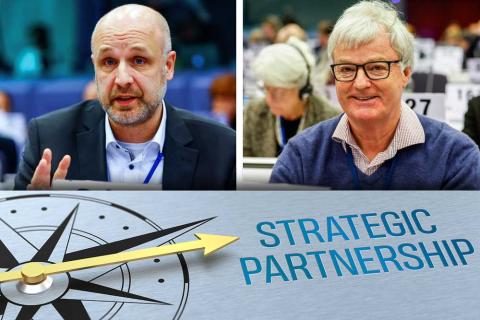European Economic
and Social Committee
Security is more than defence, stresses EESC
At its January plenary session, the EESC debated the EU's "Strategic Compass" vision for security and defence, pointing out that security should be understood broadly, far beyond military defence. Civilian and preventive security policy should complement military defence capabilities, with NATO being the EU's key security provider. Civil society should not be a bystander in security issues. In fact, as proven in the current war in Ukraine, it can have a stabilising role in times of crisis.
The EESC's own-initiative opinion on The EU Strategic Compass (SC), expresses the need for a broader definition, as the present concept of security in the SC is too narrow. Security goes beyond mere military defence. In times of complex, hybrid threats, the concept of security should be expanded to also include aspects of energy, transport, digital, water and food security, citizens' security, and foreign interference
, said the rapporteur and EESC member Christian Moos.
Social peace and economic stability are important prerequisites for non-violence. These are basic aspects of our lives, that concern us all. That is why civil society must be involved in the debate and contribute to the development of the EU's security strategy
, added Mr Moos.
The opinion argues that, in parallel with national capability, defence planning and joint procurement, the EU should continue to invest its limited resources primarily in civilian policies and mechanisms in order to enable conflict prevention. This is where civil society can make a difference, through its social and economic networks, together with its strong potential for public and cultural diplomacy.
Civil society has a key role to play in attaining greater resilience against hybrid attacks and systemic undermining of cohesion and solidarity within and between the EU Member States by inimical powers.
As Peter Clever, EESC member and co-rapporteur for the opinion, put it: Defence capabilities without the willingness of societies to make determined use of them would be ineffective
.
EU and NATO – a stronger alliance for a secure future
The return of war to Europe with Russia's aggression against Ukraine has been a "wake-up call" for the EU's relationship with NATO. The Alliance is not only a strategic partner of the EU, but Europe's sole valid security guarantor. In this sense, the creation of the European Defence Union should complement NATO and not compete with it.
The EU and NATO have not fully explored the potential of their cooperation yet. Strengthening the European pillar of security and defence means strengthening NATO. When we are talking about boosting the EU's defence capabilities, it is not to compete with NATO but to complement it
said Mr. Clever.
Through its opinions on the significance of transatlantic ties, the EESC has been encouraging the EU to develop a better understanding of the crucial importance of the transatlantic partnership for NATO. This partnership was recently reaffirmed with the third signing of a Joint Declaration on EU-NATO Cooperation, aimed at further strengthening and expanding the strategic partnership between the two organisations.
As Mr Clever commented: We have used the free ride for too long and now it is time to build our strength and pull our weight in the Alliance
.
Work organisation
Downloads
-
Security is more than defence, stresses EESC
